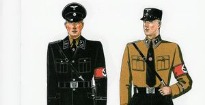Fashion and Fascism
img class="alignleft size-full wp-image-73402" title="nazi uniforms" src="/files/wxrimport/2011-03/nazi-uniforms.jpg" alt="" width="205" height="105" /><Rhonda Garelick writes in the New York Times:
AS I left a Paris cafe the other night, instead of the usual “Bonsoir, Madame,” the waiter called after me, “Happy Fashion Week!” as if we were all celebrating a national holiday.
Maybe we were. Fashion is more than business in France: it’s a mythology, a secular religion, a source of national pride, especially during Fashion Week, when the country recalls its history as the birthplace of haute couture.
In recent days, though, in response tothe anti-Semitic diatribe by Christian Dior’s creative director, John Galliano, the French have been recalling a far more ominous chapter in their history.
According to witnesses, a drunken Mr. Galliano exploded at a woman seated near him in a Paris bar. “Dirty Jewish face, you should be dead,” he is said to have told her. “Your boots are of the lowest quality, your thighs are of the lowest quality. You are so ugly I don’t want to see you. I am John Galliano!”
France is highly sensitive to such matters, and reprisals came quickly. Dior fired Mr. Galliano, who now faces charges of using a racial insult, a crime in France. But beyond the spectacle of one man’s abhorrent politics, the episode invites consideration of the curious relationship between French fashion and fascism.
During the Occupation, the Nazis and their French allies recognized the power and national prestige of the French fashion industry and sought to harness it. When the collaborationist Vichy government took over direction of the French lifestyle magazine Paris Soir, it announced in its pages a “summer of couture ... and shopping.” The Nazis were so enamored with fashion’s place in French culture that in their plans for postwar Europe, they stipulated that, unlike other industries, the fashion sector would remain in France.
Many in fashion were eager to play along.
Click here to read more.
